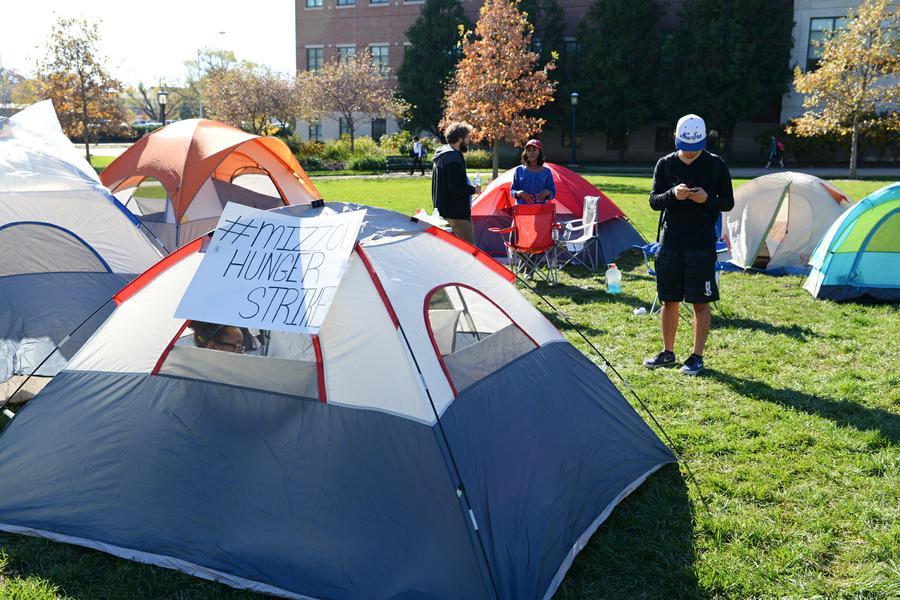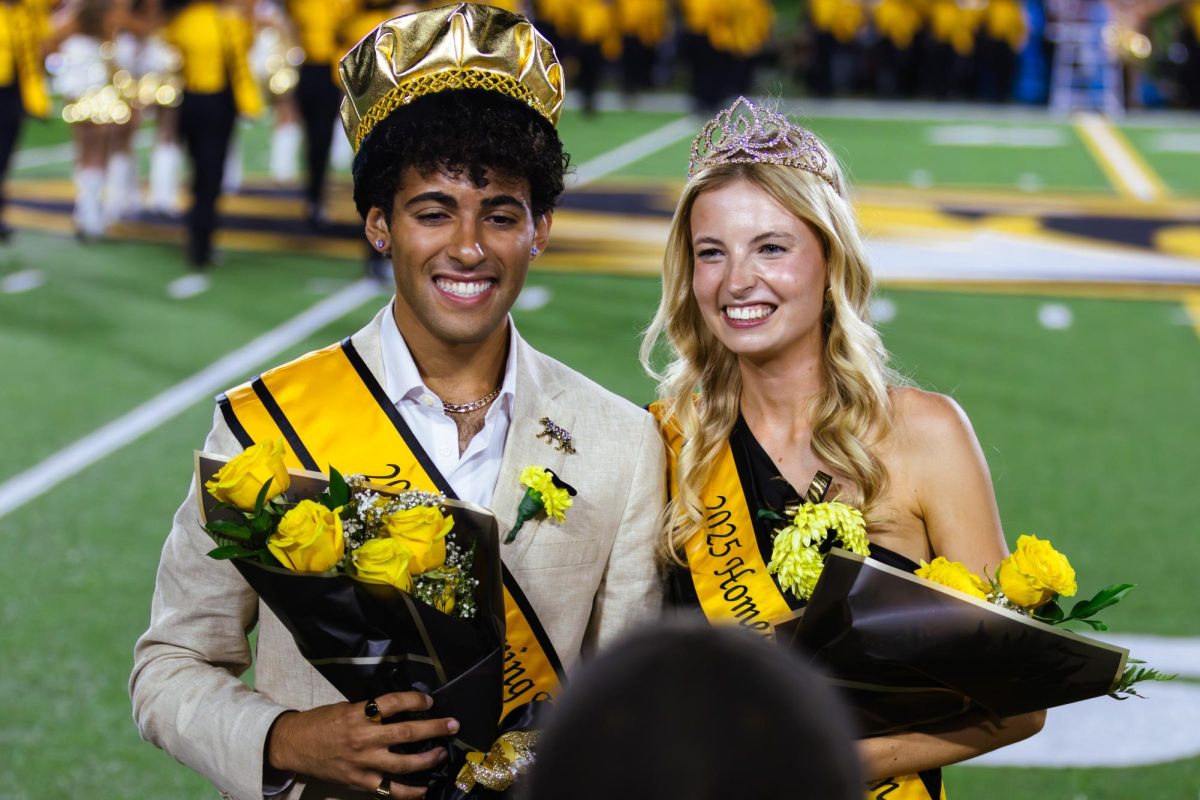It has been more than 24 hours since graduate student Jonathan Butler announced and began his hunger strike, calling for UM System President Tim Wolfe’s resignation. Since then, his decision has garnered support from students across campus.
On Monday night, members of Concerned Student 1950 organized a campout on Carnahan Quad to support Butler’s cause. Butler said the hunger strike will end when Wolfe resigns, is removed from office, or when Butler’s organs fail. The campout has a similar goal, said Concerned Student 1950 member Ayanna Poole.
Nine tents are set up in the quad, many of them with signs reading, “[#MizzouHungerStrike](https://twitter.com/search?q=%23MizzouHungerStrike&src=tyah),” which is the hashtag Butler used in a letter sent to university officials and posted on his Facebook announcing his hunger strike.
“The campout raises awareness,” Poole said. “It lets administration, faculty, everyone, it lets them know that we will not be moved. We will continue to fight.”
The point of the campout is to create awareness and discussion about race relations on campus, according to Poole.
“We want more people to be aware (about the issue),” Poole said. “People aren’t aware of the things that marginalized students go through and injustices on and off campus. This brings that discussion. It makes it happen. For us to be here (in the quad), that makes us accessible to students on campus.”
Butler’s hunger strike has rallied many student supporters, such as senior Storm Ervin, a participant in the campout.
“I stand in solidarity with Mizzou Hunger Strike, Concerned Student 1950, fighting oppression, racism and postsecondary institution,” Ervin said. “I feel that Tim Wolfe adds to that oppression and a lot of the injustices.”
Wolfe released a [statement](http://www.umsystem.edu/ums/news/news_releases/110315_statement) Monday about Butler’s hunger strike through UM System spokesman John Fougere.
“It is very concerning to me when any of our students’ well-being is in jeopardy, and I am especially concerned about the health and safety of MU student Jonathan Butler,” Wolfe said in the statement. “Jonathan is a valued and effective voice in our struggle to combat racial injustice. When I heard that Jonathan was participating in a hunger strike, I contacted him directly that day and expressed my worries for him. I also indicated to him my desire to have additional meetings with him and the ConcernedStudent1950 group, beyond the initial meeting we had on October 26. The only way we can begin to address the systemic and pervasive issue of racism in society and the effects it has on our campuses is to engage in dialogue, to build deeper relationships and have frank conversations. From these conversations, we must make changes in policy that ensures that our campuses promote a culture of respect.”
Wolfe said it’s his role as the president of the four-campus system to support the different chancellors.
“Not so long ago, we faced another seemingly intractable challenge in improving the way our campuses addressed another societal problem, sexual harassment and assault,” he said in the statement. “That time, we worked together as a campus community to find solutions so that now the University of Missouri System is a national model in how we address sexual misconduct and Title IX compliance. I am confident we can reach that standard again with regards to addressing and combatting racism.”
Some of the campout participants were displeased with Wolfe’s response.
“Once I heard ‘open dialogue,’ I didn’t want to hear it,” Poole said. “Open dialogue has been what we’ve been doing since I got here in 2011. Open dialogue hasn’t made any social change. And if I haven’t seen any change in the four and a half years I’ve been here, then open dialogue is clearly not doing it.”
Though Butler has a large amount of support in his effort to create change on campus, he [posted on Facebook earlier today](https://www.facebook.com/Butler.L.Jonathan/posts/10206059527099655?pnref=story) urging people to understand that his hunger strike is about much broader issues than MU’s recent racially charged incidents.
“For all those on social media and other platforms stating, ‘Stand with JB’ or ‘Stand with Jonathan’ I would ask that you please do NOT do so,” Butler said in his Facebook post. “The movement towards justice IS NOT about me. I am only one person fighting against injustice in the best way I know how … So instead stand with ALL those fighting for what’s right at Mizzou.”
[Student Coalition for Critical Action](https://www.facebook.com/MizzouSCCA/) founder and Concerned Student 1950 member Reuben Faloughi was not surprised by Butler’s insistence to divert the attention away from his hunger strike towards bigger problems.
“It’s typical JB, he’s one of the most selfless people I know,” Faloughi said.
Butler’s student right advocacy began in August, when graduate student workers temporarily lost their health insurance. He has also participated in the Concerned Student 1950 Homecoming parade protest, MU 4 Planned Parenthood and Racism Lives Here.
According to [Columbia Missourian reporting](http://www.columbiamissourian.com/news/higher_education/update-mu-student-embarks-on-hunger-strike-demands-wolfe-s/article_35ab864a-8186-11e5-902b-6f136a45260b.html), Butler and the rest of Concerned Student 1950 met privately with Wolfe on Oct. 26, but Wolfe refused to meet any of the group’s demands. Among other demands, they included calling for Wolfe’s resignation, increasing the number of black faculty members by 10 percent, providing additional funding for the social justice centers on campus.
Butler made the decision to carry out a hunger strike on Oct. 10 after the Homecoming parade, according to the Missourian, and the meeting with Wolfe did not affect his decision. According to Poole, he did not announce his decision to the rest of Concerned Student 1950 until this past Sunday at midnight.
“It’s not out of his character. He’s very, very persistent and he will to great lengths to do it to make sure it’s done,” Poole said of Butler’s decision. “He’s very powerful, very strong. He’s willing to put himself in difficult situations for the good of humanity.”
Poole said that the rest of Concerned Student 1950 had no idea that Butler was going to carry out a hunger strike. She did say Butler repeatedly said the word “sacrifice” in the weeks leading up to the announcement, but it’s a term that all members of Concerned Student 1950 say.
“Sacrifice is a big part of this movement,” Poole said. “We’re all sacrificing a lot. We’re sacrificing our homes. We’re sacrificing our health because it gets cold at night, so that’s what we thought when he said ‘sacrifice.’ We didn’t know that this was going to happen, but it was his decision.”
Poole initially did not want Butler to follow through with his decision, but tried to see the positive side of the situation once she saw that this was something she he wanted to do.
“We’re all hungry for justice,” Poole said. “Essentially we’re fighting a system. This system is starving us. This is what the black community is going through: we’re starving for knowledge, we’re starving for justice, we’re starving for resources. And in order to do that we do need to put our lives on the line.”
Both Poole and Faloughi hope that Butler’s hunger strike becomes a turning point for changing race culture on campus.
“I hope this is a catalyst for the transformative cohesion that we talk about in the SCCA, just really transforming what Mizzou’s culture looks like,” Faloughi said.
“This is going to be a turning point,” Poole added. “It’s a life versus a job, and one of them deserves it and that’s Jonathan Butler’s life. He deserves to live it.”














